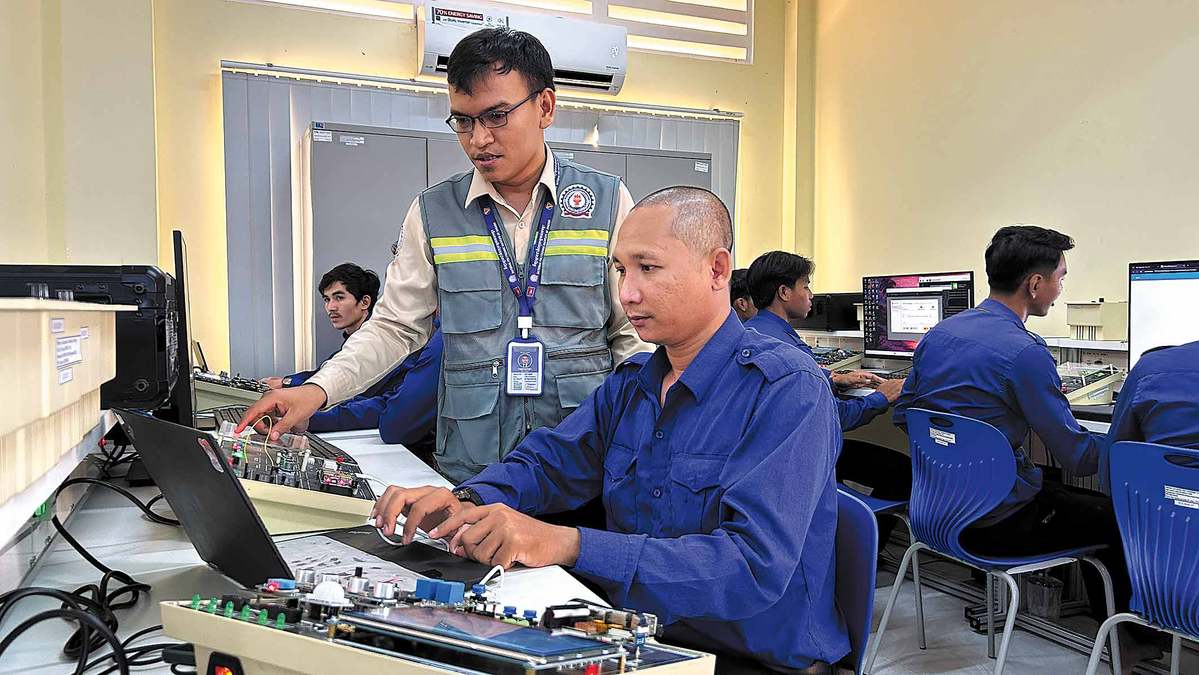
"Knowledge reshapes destiny" is a belief many people have, hoping to change their lives through learning. This universal motto is guiding the path of Mov Yus, a 21-year-old woman who dreams of earning a good living by studying new technology with support from China.
Mov, a sophomore at the National Polytechnic Institute of Angkor in northwestern Cambodia's Siem Reap province, is the most educated of her six siblings. Majoring in mechatronic manufacturing, she earned a full scholarship to study at the school and aims to carve out a bright future with information technology skills.
"Three of my siblings are now working at construction sites in Thailand. Many girls in Cambodia find jobs in service sectors, but I decided to learn IT as it's now the crucial driving force for the country's development," she said. "I will find my value in this industry in the future."
READ MORE: Cambodia seeks greater healthcare exchanges with HK
Mov is among the school's 2,400 students who have had or will gain professional training support from their "sister school" — Hainan Technician College in China.
In collaboration with the Ministry of Labour and Vocational Training of Cambodia, the "ILO/China Partnership Program on Strengthening Skills Development in Cambodia, Lao PDR and Myanmar through South-South and Triangular Cooperation (SSTC)" launched a package of skills development training in Cambodia in 2020, with support from China's Ministry of Human Resources and Social Security.
The program has been instrumental in elevating Cambodia's workforce by linking vocational training to labor market needs, promoting green and digital skills, and fostering international partnerships with technician institutions in China.
"China's infrastructure, machinery and skills are very advanced. Moreover, the chance to visit Chinese companies with cutting-edge technologies was really an eye-opening experience to us that has helped broaden our horizons a lot," said Plek Proney, a trainer with the National Polytechnic Institute of Angkor who has visited China three times to receive professional training guidance.
"Many new machines that are used now in Cambodia have been donated from China, so we need to update (our) skills. The encouraging thing is that skills training has increased our students' employment rate, helped them get promotions and raised their salaries," he said, adding that salary growth has tripled in some positions.
Plek said many of his students are eager for the chance to visit China. During his trips to the country, he was surprised to learn that many Chinese teachers have led student teams to participate in several international vocational skills competitions, with good results.
Although new technologies have revolutionized nearly all industries worldwide, Cambodia still faces challenges due to a lack of technological support and facilities, said Rath Ratanak, deputy director of the National Polytechnic Institute of Angkor.
Apart from traditional skills such as tourism services and culinary training, he said Cambodia is in urgent need of talent specializing in cloud technology, artificial intelligence, computer science and parametric robot control — aspects that are now widely adopted in the manufacturing industry.
"More importantly, ILO/China introduced a 'digital recognition of prior learning system' for the construction sector at our school, which has certified 500 participants," Rath said. "It helped us standardize professional training and better match with the international standard."
According to Tian Feng, project manager and coordinator of the ILO China Partnership Program on Strengthening Skills Development, the program focuses on helping Cambodia, Laos and Myanmar enhance skills development cooperation with fellow members of the Association of Southeast Asian Nations and support the Skills Dream-Building Initiative. So far, it has benefited more than 48,000 individuals in the region, 35 percent of them women.
"In Cambodia, apart from the IT professionals that are in urgent need, we also conducted a targeted training program for 194 tourism professionals, including 113 women, that focused on food and beverage services and Chinese culinary skills," Tian added.
During the 13th ASEAN Plus Three Labor Ministers' Meeting last October, Cambodia's Minister of Labor and Vocational Training Heng Sour praised the program for its vital role in strengthening skills development, improving labor market systems, and fostering greater collaboration between the public and private sectors in Cambodia.
Under the framework of the ILO/China Partnership Program, some Chinese technician colleges have organized a study tour to China focused on skill training, according to Rath.
"During our visits to China, we were all deeply impressed by the diligence and enthusiasm of Chinese people either in school or at the factories. We hope such training programs can be continued through more diversified forms, and that more memorandums of understanding can be signed between schools from both countries," he said.
READ MORE: PM: Cambodia needs more Chinese investments
"In the near future, we also hope that Cambodians' professional skill certificates can be recognized in China, boosting cross-border employment as well as providing Cambodian students with more access to Chinese enterprises in Cambodia," he added. "We also look forward to more professional training competitions in the future, encouraging Cambodian students to step on a bigger stage."


